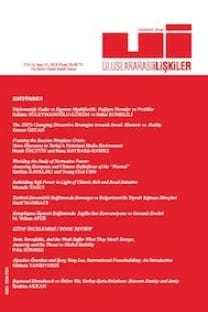Atlantik Paktı’ndan NATO’ya: Türkiye Büyük Millet Meclisi’nde Türkiye’nin Konumu ve Uluslararası Rolü Tartışmalarından Bir Kesit
Bu makale Türkiye’nin Kuzey Atlantik İttifakı’na (NATO) giriş sürecinde dış politika söylemleri aracılığıyla oluşan kimliği, eleştirel jeopolitik çerçevesinde irdelemektedir. Bu makalenin ana tezi ülkelerin dış politika yoluyla oluşturdukları kimliklerin sadece konum, kültür ve değerden ibaret olmadığı, bu denkleme bir de ülkelerin üstlendikleri uluslararası işlevin eklenmesi gerektiğidir. Türkiye örneğini değerlendirmek amacıyla Türkiye’nin NATO’ya girişinden hemen önce ve sonrasında Türkiye Büyük Millet Meclisi’nde (TBMM) yapılan çeşitli konuşmalar incelenmiştir. Varılan sonuç bu yıllarda konum, kültür ve değer olarak kendini Batılı sayan Türkiye’nin Doğu’ya uzanmayı görev olarak bellediği ve dolayısıyla üstü kapalı bir eşiksel kimlik yaratıldığıdır.
Anahtar Kelimeler:
Türkiye-NATO, Dış Politika, Kimlik, Eşiksellik, Güvenlik, Batıcılık
From the Atlantic Pact to NATO: Debating Turkey’s Location and Function in the Turkish Grand National Assembly
This article, using critical geopolitics as a framework, analyzes identity formation in Turkey during Turkey’s NATO accession. The main thesis of this article is that identity that is made through foreign policy discourse should not only be confined to debates about location, culture and values but should also include a country’s own perceptions about its international function. This article analyzes debates in the Turkish Grand National Assembly just before and after Turkey’s NATO accession and it argues that though Turkish elites perceived itself as part of the West in terms of location, culture and values, this was not the case in terms of international function. By becoming the disseminator of the Western security understanding to the Middle East as part of the West, Turkey during these years has started to carve itself a liminal identity. This limnality, however, was a covert one because Turkey perceived itself as part of the West in terms of location, culture and values, but assumed an in-between role in terms of function in the international system
Keywords:
Turkey NATO, Foreign Policy, Identity, Liminality, Security, Westernism,
___
- .......
- ISSN: 1304-7310
- Başlangıç: 2004
- Yayıncı: Uluslararası İlişkiler Konseyi Derneği İktisadi İşletmesi
Sayıdaki Diğer Makaleler
NATO’nun Balistik Füze Savunma Sistemi ve Türkiye
Türkiye-NATO İttifakının Tarihsel Boyutu
NATO’nun Dönüşümü ve Kamu Diplomasisi’nin Artan Rolü
NATO ve Türkiye: Dönüşen İttifakın Sorgulayan Üyesi
Soğuk Savaş’ta NATO-ABD-Türkiye Üçgeninde Askeri Üsler: Süreklilik ve Değişim
Yeni Savaş ve Siber Güvenlik Arasında NATO’nun Yeniden Doğuşu
NATO’nun Değişen Enerji Güvenliği Algısı: Türkiye’nin Olası Konumu
